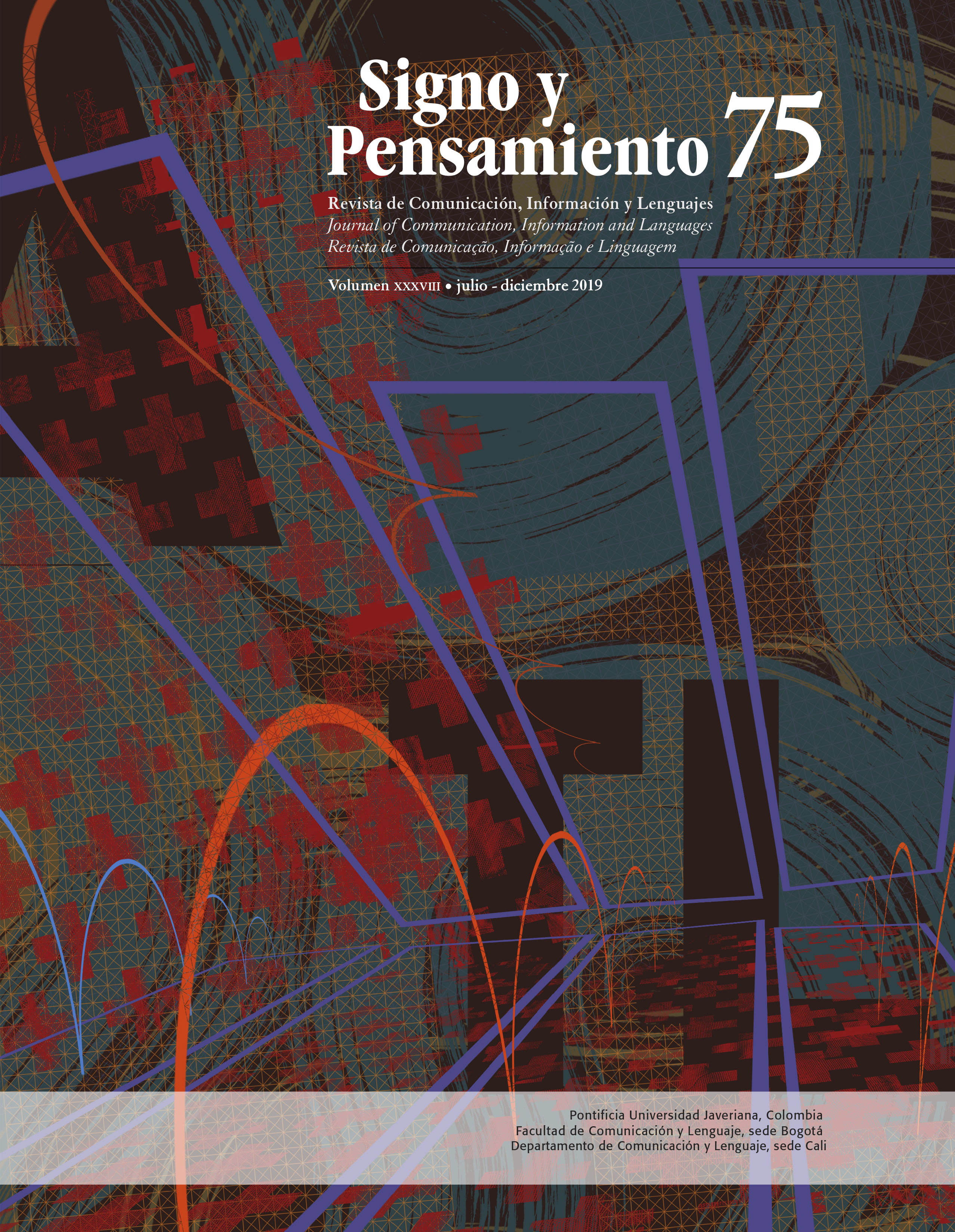Abstract
The light shed by theories dealing with this issue and the related pedagogical approaches inform this paper, which is intended as a look to the teaching of the communication theories in different communication colleges in Bogotá. It is clear that in any teaching-learning process the student is a fundamental actor; however, the research deals with the tension between two subjects in the process: teachers and programs of communication theories.
Berelson, B. (2004). The State of Communication Research. En J. Peters y P. Simonson (eds.), Mass Communication and Social Thought (pp. 440-445). Maryland, Estados Unidos: Rowman & Littlefield.
de Moragas, M. (2011). Interpretar la comunicación. Estudios sobre medios en América y Europa. Barcelona: Gedisa.
de Zubiría, J. (2008). Los modelos pedagógicos. Hacia una Pedagogía dialogante. Bogotá: Magisterio.
Fals Borda, O. (2008). La investigación acción en convergencias disciplinares. Recuperado de http://historiactualdos.blogspot.com.ar/2008/11/la-investigacin-accin-en-convergencias.html.
Flórez, R. (2008). Pedagogías del Conocimiento. Bogotá: Mcgraw Hill.
Fuentes Navarro, R., y Vasallo de Lopes, I. (comps.). (2001). Comunicación, campo y objeto de estudio. Guadalajara: Iteso.
Galindo, J. (2008). Comunicación, ciencia e historia. Fuentes científicas históricas hacia una comunicología posible. Madrid: McGraW Hill Interamericana.
García Corredor, C. P., y Rodríguez Bohórquez, L. F. (2011). Sobre profesiones, prácticas y oficios de la comunicación. Signo y Pensamiento, 31(59), 298-306.
Kant, E. (s. f.). Pedagogía. Recuperado de https://www.ddooss.org/articulos/textos/kant_pedagogia.pdf.
Martín Serrano, M. (2006). Para qué sirve estudiar Teoría de la Comunicación. Contratexto, (14), 41-48.
Martino, L. (2007). Teorías da Comunicaçao: mutias ou poucas. Sao Paulo: Atelie.
Mattelart, A. (1997). Historia de las teorías de comunicación. Barcelona: Paidós.
Maxwell, J. (2004). Reemergent scientism, postmodernism, and dialogue across diferences. Revista Qualitative Inquiry, (10), 35-41.
Ministerio de Educación Nacional de Colombia (MEN). (2006). Guía No. 3. Manual de evaluación del desempeño de docentes y directivos docentes. Bogotá: MEN. Recuperado de https://www.mineducacion.gov.co/1759/w3-article-81030.html.
Pereira, J. M. (2005). La comunicación: un campo de conocimiento en construcción Reflexiones sobre la comunicación social en Colombia. Investigación & Desarrollo, 13(2), 412-441.
Rizo, M. (2012). Las teorías de la comunicación en la construcción del campo académico de la comunicación: apuntes históricos, reflexiones epistemológicas y retos pedagógicos. Lima: Congreso de Felafacs.
Saintout, F. (2003). Abrir la comunicación. Tradición y movimiento en el campo académico. La Plata: Facultad de Periodismo y Comunicación Social Universidad de la Plata.
Torrico, E. (2004). Abordajes y períodos de la teoría de la comunicación. Buenos Aires: Norma.
Torrico, E. (2010). Comunicación: de las matrices los enfoques. Quito: Ciespal.
Vidales, C. (2010). Semiótica y Teoría de la Comunicación. Tomo I. Monterrey: Colegio de Estudios Científicos y Tecnológicos del Estado de Nuevo León.
Vidales Gonzáles, C. (2011). El relativismo teórico en comunicación. Entre la comunicación como principio explicativo y la comunicación como disciplina práctica. Comunicación y Sociedad, (16), 11-45.
This journal is registered under a Creative Commons Attribution 4.0 International Public License. Thus, this work may be reproduced, distributed, and publicly shared in digital format, as long as the names of the authors and Pontificia Universidad Javeriana are acknowledged. Others are allowed to quote, adapt, transform, auto-archive, republish, and create based on this material, for any purpose (even commercial ones), provided the authorship is duly acknowledged, a link to the original work is provided, and it is specified if changes have been made. Pontificia Universidad Javeriana does not hold the rights of published works and the authors are solely responsible for the contents of their works; they keep the moral, intellectual, privacy, and publicity rights.
Approving the intervention of the work (review, copy-editing, translation, layout) and the following outreach, are granted through an use license and not through an assignment of rights. This means the journal and Pontificia Universidad Javeriana cannot be held responsible for any ethical malpractice by the authors. As a consequence of the protection granted by the use license, the journal is not required to publish recantations or modify information already published, unless the errata stems from the editorial management process. Publishing contents in this journal does not generate royalties for contributors.



